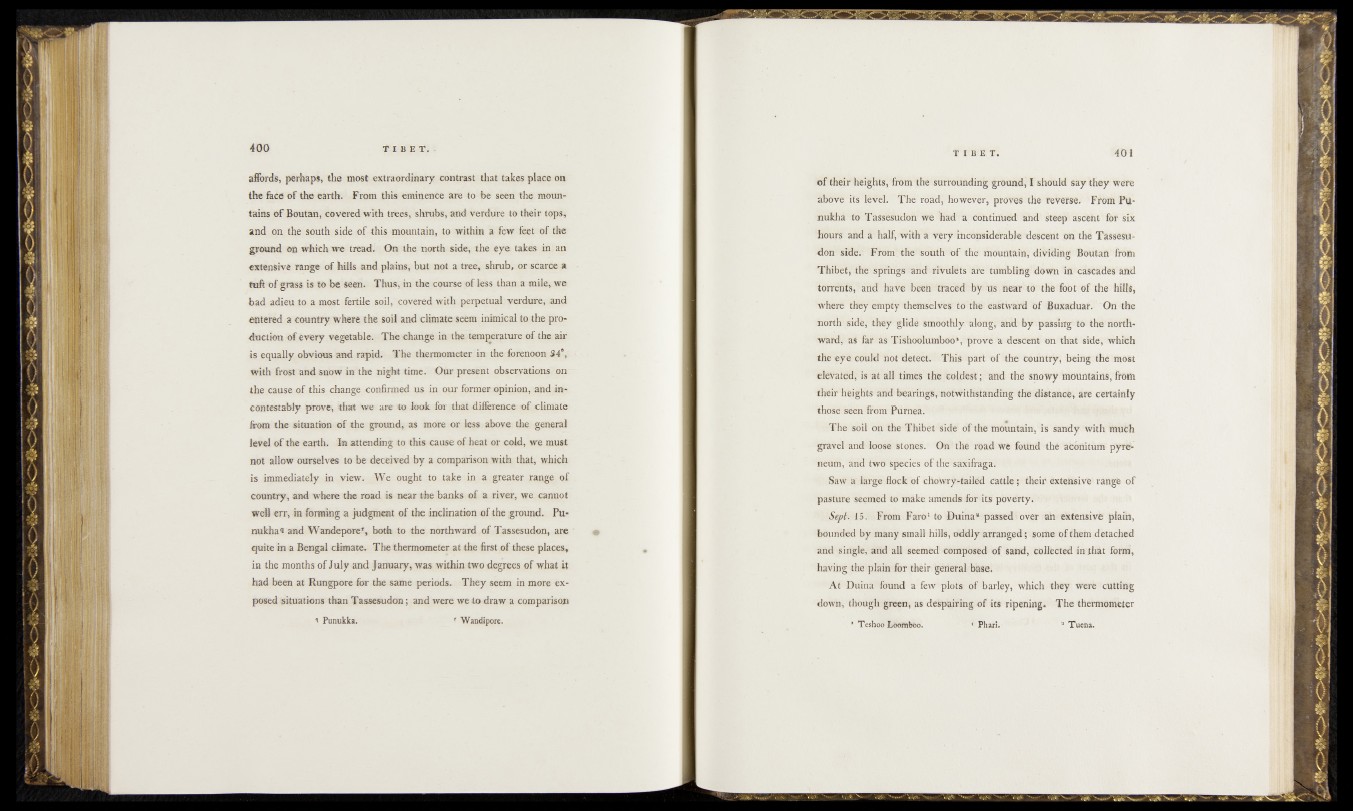
affords, perhaps, the most extraordinary contrast that takes piace on
the fees of the earth. From this eminence are to be seen the mountains
o f Boutan, covered with trees, shrubs, and verdure to their tops,
and on the south side of this mountain, to within a few fast of the
ground on which we tread. On the north side, the eye takes in an
extensive range of hills and plains, but not a tree, shrub, or scarce a
tuft o f grass is to be Seen. Thus, in the course of less than a mile, we
bad adieu to a most fertile soil, covered with perpetual verdure, and
entered a country where the soil and climate seem inimical to the production
of every vegetable. The change in the temperature erf the air
is equally obvious and rapid. The thermometer in the forenoon S4°,
with frost and Snow in the night time. Our present observations on
the cause of this change confirmed us in our forme* opinion, mid in-
contestably prove, that we are to look for that difference o f climate
from the situation of the ground, as more or less above the general
level of the earth, ha attending to this cause of heat or cold, we must
not allow ourselves to be deceived by a comparison with that, which
is immediately in view. We ought to take in a . greater range of
country, and where the read is near the banks of a river, we cannot
well err, in farming a judgment of the inclination of the ground. Pu-
nukha'J and Wandeporer, both to the northward of Tassesudon, are
quite in a Bengal climate. The thermometer at the first of these places,
in the months of July and January, was within two degrees of what it
had been at Rungpore for the same periods. They seem in more exposed
situations than Tassesudon; and were we to draw a comparison
’ Punukka. r Wandipore.
of their heights, from the surrounding ground, I should say they were
above its level. Tftë fóï‘df,’ffdwevër, proves thé reversé. From PU-
nufcha to Tassesudon we had a continued and steep asceht for six
hours and a half, with a very inconsiderable descent on the Tassesudon
side. From, the south of the thô'unt&te, dividing B&Utafl from
Thibet, the springs and rivulets are tumbling down ifi cascades and
torrents, and have been traced by us near to the foot of the hills,
where they empty themselves to the eastward of Buxaduar. On the
north side, they glide smoothly along, ahd by passing to the northward,
as far as Tishoolumboo*, prove a descent on that side, which
the eye could not detect. This part of the country, being the most
eleVatcd, is at all times the coldest ; and the snowy mountains, froth
their heights and bearings, notwithstanding the distancé, are certainly
those seen from Putnea.
The soil on the Thibet side of the mountain, is sandy with iftuth
gravel and loose stones. On the road we found the atom turn pyre-
neum, and two species of the saxifraga.
Saw a' large flock of choWry>-tailed cattle ; their extensive range of
pasture seemed to make amends for its poverty,
Sept. 15. From Faro* to Duma* passed over ah extensive plain,
bounded by many small hills, oddly arranged; sorbe of them detached
and single, and all seemed composed of Sand, collected in that form,
having the plain for their general base.
At Duina found a few plots of barley, which they were cutting
down, though green, as despairing of its ripening. The thermometer
* Teshoo Loomboo. ‘ Phari. * Tuena.